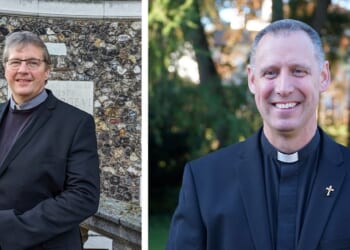FOR A young adult coming to church for the first time, simply getting to and through the first service is a daunting prospect. Churches’ online presence, where it exists, describes their beliefs and practices in euphemisms that make sense only to those already familiar with the smorgasbord of Church of England options.
Jargon and out-of-date websites unite to confound the uninitiated. My local churches advertise everything from “Catholic Worship” through to “English Missal Eucharist” and “liturgy inspired by the Iona Community”, and detail membership of the Evangelical Alliance, The Society, or the Inclusive Church network, without explanation. For a generation used to finding information online, clear and accurate websites or social media make church significantly more accessible.
Once you are at church, the average service is an hour of the unknown: so much to follow, so many unwritten “rules”, and so (potentially) intellectually challenging or emotionally taxing. At better-resourced churches, you might be greeted at the door, have a well-produced service booklet handed to you, and have your moment to ask questions. Finessing the church “user experience” is difficult on a shoestring, but such small operational improvements could make coming to church for the first time infinitely less baffling.
AS NEW worshippers become regulars, they face the difficulty of coming to understand and adopt Christian beliefs. Historically, the Church benefited from a hegemonic position in the religious education of the average Brit, but new churchgoers today probably know little more about Christianity than core directives to “love thy neighbour”, and a mostly correct version of the nativity as staged at their primary school. No part of the faith can be presumed to be obvious.
Many Christian teachings are not immediately intuitive or unchallenging, particularly in a materialist and individualist 21st-century society. If investigation into the “quiet revival” has suggested anything, though, it is that converts are not looking for watered-down platitudes, but clear spiritual direction and an alternative to the banality of secular life (Features, 15 August). Mission plans for growth should come with an understanding of how we can replace that lost religious education, and a willingness to assert confidently the truths of the faith.
Of course, becoming a Christian requires more than simply learning new facts. Particularly for those from non-religious backgrounds, Christianity represents a fundamentally different outlook on life, complete with its own language of faith. Articulating spiritual truths can feel very difficult out of a former atheist’s mouth, but, like all languages, this one can be learned through immersion. If we want people to talk about God, churches must provide spaces for people to practise talking about God, whether that is in more “structured” educational settings, youth or special- interest groups, or even just over tea and coffee after the eucharist.
Where these spaces allow new and old Christians to mix, the benefits flow both ways. Besides bringing fresh energy and perspectives to challenges that the Church faces, converts can help longer-standing churchgoers to work through their own issues with faith. Too many commentators on new “quiet-revival” Christians have questioned the motives or strength of faith of these newcomers, seemingly unaware that the same doubts and mixed motivations are to be found in existing congregations.
As I have talked about my adult conversion experience, longer-term churchgoers have told me of their own uncertainty or periods of departure from the faith. One congregation member, for example, felt able to tell me, when I was not yet baptised, the reason that she did not feel “good enough” to go up to receive communion. Such compassion and companionship is both attractive to newcomers, who are often seeking community, and a way to demonstrate love for our Christian brothers and sisters. The doubts, misgivings, and mistakes of the new open up space for all of us to learn and grow in faith together.
IF EVIDENCE of a “quiet revival” is to be believed, far more churchgoers than before may now be experiencing the struggles (and joys) of adult conversion, bringing with them distinct new challenges and needs. With some small “operational” improvements, confident communication of the faith, and support for local church groups and communities, the Church can ease these converts’ journeys and ensure that newcomers put down roots that last.
Whether these “quiet-revival” arrivals form a tidal wave or a trickle, it seems likely that, given the decline in families’ bring children to church, future church growth will depend increasingly on adult converts rather than confirmation in childhood. It is vital that we be confident and clear in our communication of our faith, and that we provide the spaces and community in which new Christians can learn and grow. If we can teach them to speak our language, it is not only their souls that will benefit.
The author writes under a pseudonym.

















